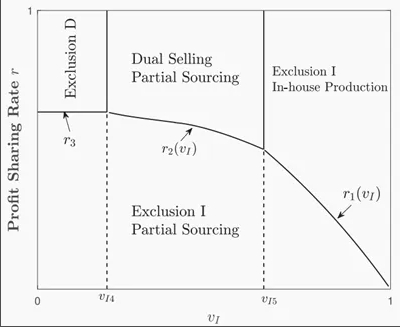In today's era of intensifying global trade friction and technological competition, supply chain stability faces unprecedented challenges. Downstream manufacturers are increasingly aware of the significant risks posed by over-reliance on single suppliers—whether due to technological blockades or trade sanctions, such dependencies can paralyze production. Consequently, more firms are investing heavily in R&D to move up the value chain, seeking to develop in-house capabilities for core components. Simultaneously, key component suppliers are adjusting their strategies, not only optimizing distribution networks but also responding to competitive pressures from manufacturers' vertical integration efforts. Furthermore, government interventions—such as trade bans and export controls—are reshaping supply chain structures and profoundly impacting consumer welfare. Against this backdrop, critical questions arise: How should suppliers design distribution strategies to maintain market share? How can manufacturers mitigate supply disruption risks through in-house R&D? And how do trade sanctions affect supply chain performance and consumer welfare?
The collaborative paper "Distribution Strategy, Capability Investment, and Government Regulation" by Yuan Mao, Fernando Bernstein, Guan Xu, and Wang Yulan constructs a game-theoretic supply chain model to analyze how government regulations influence R&D investment decisions, revealing the pivotal role of in-house capabilities in shaping equilibrium market structures, supply chain efficiency, and consumer welfare.

Figure 1: Equilibrium Distribution and Outsourcing Strategies
Key Findings:
Strategic R&D as Defense: Independent manufacturers can effectively counter suppliers' exclusive distribution strategies by significantly increasing R&D investments, thereby reducing supply chain disruption risks.
Dual Effects of Trade Bans: Trade sanctions exhibit a dual impact on manufacturers' R&D incentives—they may either stimulate or suppress investment, depending on contractual terms in free-trade environments and the manufacturer's cost structure.
Asymmetric Outcomes: While trade bans invariably harm suppliers, they may paradoxically benefit manufacturers by impairing suppliers' operational efficiency and enhancing the competitive edge of self-reliant firms.
Consumer Welfare Implications: Under certain conditions, trade bans can incentivize quality-enhancing R&D, ultimately improving end-product quality for consumers.
These insights provide a nuanced understanding of the complex interplay between policy interventions and supply chain dynamics.
Publication Details:
Office of Scientific Research and Discipline Development
Edited by: Song Lan
Reviewed by: Liu Yanqing
 Faculty and Staff
Faculty and Staff Academics
Academics International Exchange
International Exchange







